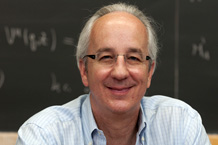Unraveling string theory
There are four fundamental forces of nature: gravity, electromagnetism, the weak nuclear interaction and the strong nuclear interaction. Some theoretical physicists believe that string theory could explain and reconcile these natural forces under one set of unifying laws.
String theory posits that when observed on a small enough scale, elementary particles are actually excitations of tiny vibrating strings. To detect the difference between these hypothetical strings and ordinary particles requires energies much higher than those produced at the world's highest energy accelerators. Therefore scientists do not know whether string theory is correct.
The inability of string theory to produce quantitative experimental predictions has led to claims that string theory is not even testable. One person out to change that is theoretical physicist Jeffrey Harvey, PhD, Enrico Fermi Distinguished Service Professor of Physics at the University of Chicago, the Enrico Fermi Institute and the College.
"I want to find a way to confront the mathematical structures of string theory with experimental data," he says.
Harvey, who studies the theoretical behavior of particles, natural forces, string theory and cosmology, is the principal investigator on a $750,000 American Recovery and Reinvestment Act grant from the National Science Foundation.
Harvey's research focuses on the strong nuclear interaction, which is about 100 times stronger than the next strongest force, electromagnetism. It binds protons and neutrons together in the nuclei of atoms; it also binds quarks to protons and neutrons. Because these forces are so strong, they are difficult to study.
"The research we are doing involves tying to compute how these strong interactions work," Harvey explains. "It requires the development of new mathematical tools, tools which grew out of string theory."
Developing new tools
Another important goal of the research is a better understanding of the forces at work in both astrophysics on the largest scale and particle physics on the smallest scale.
"We're looking for connections to cosmology to understand, for example, why the universe is accelerating, and why galaxies behave as if there is a huge amount of 'dark matter'," says co-principal investigator Richard Hill, PhD, Assistant Professor of Physics at the University, the Enrico Fermi Institute and the College.
The research will also lead to more precise theoretical techniques to enable new discoveries in physics, he adds. "My work is aimed at better understanding nature, developing new ideas for experiments to look for new particles, and helping to interpret experimental results."
The grant funds one postdoctoral research position and supports two graduate students. "Without the help of these additional scientists, it would take much longer to do this work," Harvey says.
An unusual feature of this grant is that is covers community outreach. Hill will act as a mentor and consultant for an independent study program at the University of Chicago Laboratory School. This will give high school seniors exposure to university-level research and the opportunity to investigate a research question from one of the energy, intensity, temperature and density, or cosmic frontiers. Harvey and Hill will participate in other outreach programs that will probably include appearing on local radio and television programs and giving public lectures. "Mentoring young scientists at the graduate and postdoctoral level is also an integral part of our work," Hill says.
"A society proficient in science leads to important advances," he says. "It's an exciting time for particle physics, and University of Chicago is in the thick of it."
by Greg Borzo
This award is funded under the American Recovery and Reinvestment Act of 2009, NSF Award number: 0855039. For more information on NSF's Recovery Act projects, visit NSF Recovery Act.

Theoretical physicist Jeffrey Harvey received a $750,000 ARRA grant from the NSF to produce quantitative experimental predictions in support of string theory.
Photo by Lloyd DeGrane.










